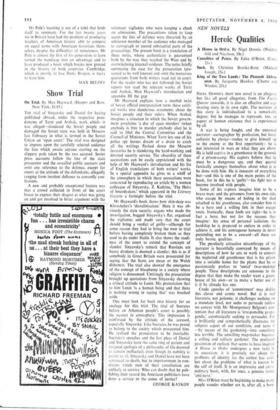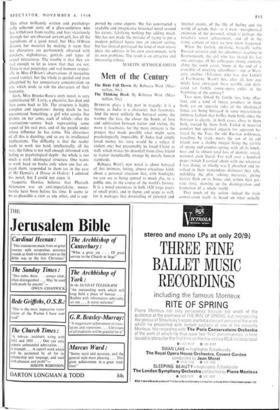NEW NOVELS
Heroic Qualities
Casualties of Peace. By Edna O'Brien. (Cape, 21s.) Such. By Christine Brooke-Rose. (Michael Joseph, 25s.) King of the Two Lands : The Pharaoh Akhen- aten. By Jacquetta Hawkes. (Chatto and Windus, 25s.)
NIGEL DENNIS's short new novel is an allegory; but likz all good allegories, from The Faerie Queene onwards, it is also an effective and cap- tivating story in its own right. The narrator of this story is individualised to a remarkable degree; but he manages to represent, too, an aspect of human existence that is experienced by all.
A war is being fought, and the unnamed narrator—cartographer by profession, but horti- culturist by choice—rushes to give himself up to the enemy at the first opportunity: he is not interested in wars or what they are about. He is held captive in a greenhouse in the grounds of a prison-camp. His captors believe that he must be a dangerous spy, and they quarrel farcically amongst themselves about what is to be done with him. He is innocent of everything but—and this is one of the main points of the book, for in this he is `guilty'—his fight not to become involved with people.
Some of his captors imagine him to be a brave man; and the prisoners from his own side, who escape by means of hiding in the shed attached to his greenhouse, also consider him to be a hero and a willing link in their escape route. Ironically, these fools are right—he is in fact a hero, but not for the reasons they imagine: his sense of personal isolation; the hardship he is prepared to endure in order to achieve it, and his courageous honesty in never pretending not to be a coward—all these are truly heroic qualities.
The peculiarly attractive misanthropy of the narrator is beautifully conveyed by means of descriptions of how he sets to work to convert the neglected old greenhouse that is his prison into a suitable home for the plants that he so passionately prefers to 'social' (war-making) people. These descriptions are sensuous to the degree that they make the reader want a green- house of his own—or to make a better use of it if he already has one.
Crude apostles of 'commitment' may dislike this clever and comic novel. But it is real literature, not polemic; it challenges nothing on a mundane level, nor seeks to persuade (unless we concur with Mr Montgomery Belgion's con- tention that all literature is 'irresponsible propa- ganda,' automatically seeking to persuade). For it brilliantly and sympathetically illustrates the solipsist aspect of our condition, and turns it —by means of the gardening—into something
less terrible. The unwilling map-maker become,
a willing and solitary gardener. The profound pessimism of outlook that seems to have inspired A House in Order undergoes a new twist in its execution; it is precisely not about th.: problems of identity (as the author has said). but about the problems of what is known 13 the self of itself. It is an impressive and extra- ordinary book, with, for once, a genuine ironic 'anti-hero.'
Miss O'Brien must be beginning to make many people wonder whether sex is, after all, a bore.
This often brilliantly written and psychologi- cally coherent story of a glass-sculptress who has withdrawn from reality, and lives vicariously through her sex-obsessed servant-girl, has all the ingredients of a good novel; but Miss O'Brien distorts her material by making it seem that her characters are permanently obsessed with knickers, nightdresses, genitals and types of sexual intercourse. The trouble is that they are real enough to let us know that they are not. There is real poignancy and real humour (especi- ally in Miss O'Brien's observations of masculine sexual vanity); but the whole is spoiled and even cheapened by her unnecessary concentration on sex, which tends to rob the characters of their humanity.
Such, Miss Brooke-Rose's sixth novel, is very sophisticated SF. Larry, a physicist, has died and then come back to life. The structure is highly complex and ingenious: during death he has encountered Something, a girl who carries five planets on her arms, each of which—after his resurrection—comes back representing some aspect of his real past, and of the people under whose influence he has come. The cleverness of all this is dazzling, and so are its intellectual implications. The difficulty is that the reader needs to work too hard, intellectually, all the way; the fabric is not well enough informed with feeling or psychological depth: the whole is too much a stark ideological structure. One wants to work hard on books only when one has en- joyed them, responded to them (as in the case of Mr Dennis's A House in Order): I admired this novel, but I could not enjoy it.
Jacquetta Hawkes believes that Pharaoh Akhenaten was an anti-imperialistic, mono- theistic hero born before his time. It seems to me as plausible a view as any other, and is sup-
ported by some experts. She has constructed a readable and imaginative historical novel around his career, falsifying nothing but adding much. She has not made the mistake of trying to put a modern political figure into an ancient setting, but has instead portrayed the kind of man w hose ideas she admires in his own environment, with its own problems. The result is an attractive and interesting tribute.
MARTIN SEYMOUR-SMITH



































 Previous page
Previous page